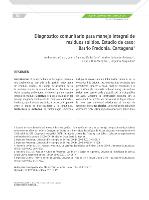Mostrar el registro sencillo del ítem
Community diagnosis for integral management of solid waste. Case study: Barrio Fredonia, Cartagena
| dc.contributor.author | Ariza-Díaz, Andrea | |
| dc.contributor.author | Sánchez-De La Torre, Valeria | |
| dc.contributor.author | Bahamón-Restrepo, Andrés | |
| dc.contributor.author | Díaz-Mendoza, Claudia | |
| dc.contributor.author | Pasqualino, Jorgelina | |
| dc.date.accessioned | 2023-07-21T16:27:08Z | |
| dc.date.available | 2023-07-21T16:27:08Z | |
| dc.date.issued | 2020 | |
| dc.date.submitted | 2023 | |
| dc.identifier.citation | Díaz Mendoza, C., Pasqualino, J., Sánchez De La Torre, V., Ariza Díaz, A., & Bahamón Restrepo, A. (2020). Diagnóstico comunitario para manejo integral de residuos sólidos. Estudio de caso: Barrio Fredonia, Cartagena. | spa |
| dc.identifier.uri | https://hdl.handle.net/20.500.12585/12358 | |
| dc.description.abstract | Introduction. The Fredonia neighborhood in Cartagena presents a problem associated with the inadequate management of solid waste, the work carried out seeks the active participation of the community in the identification of the environmental aspects to intervene for the integral management of waste.Objective. Carry out the evaluation of the integral management of solid waste for the Fredonia community, based on a technical and participatory diagnosis between the group of researchers and the community.Materials and methods. The methodology used included the collection of primary information in the study community, surveytype instruments that allowed to know the age, level of education and the perception of the community about the management of solid waste in the neighborhood and the provision of the public service of cleanliness. Through joint construction with the community of problem trees, it was possible to obtain the environmental ebaseline related to solid waste management. Results. Most of the population does not know what is the proper management that they should give to solid waste. 6 characterizations were developed by the quartering method to know the types of waste generated and their percentage distribution. The most generated waste is organic 53.59%, fabrics 11.18% and sanitary waste 8.9%. Based on this information and with the participation of the community through focus groups, problem trees were drawn up that allow the diagnosis of solid waste management in the Fredonia community. Conclusion. The research allowed the community to build eight problem trees from which eight objective trees were raised where the strategies to work for solving the problem of solid waste in the community are synthetically identified. © 2020 Corporacion Universitaria Lasallista. All rights reserved. | spa |
| dc.format.extent | 22 páginas | |
| dc.format.mimetype | application/pdf | spa |
| dc.language.iso | spa | spa |
| dc.rights.uri | http://creativecommons.org/licenses/by-nc-nd/4.0/ | * |
| dc.source | Produccion y LimpiaVolume 15, Issue 2 | spa |
| dc.title | Community diagnosis for integral management of solid waste. Case study: Barrio Fredonia, Cartagena | spa |
| dc.title.alternative | Diagnóstico comunitario para manejo integral de residuos sólidos. Estudio de caso: Barrio Fredonia, Cartagena | spa |
| dcterms.bibliographicCitation | (2013) Plan distrital de gestión del riesgo Cartagena de Indias Alcaldía mayor de Cartagena. Decreto 1713 de 2002. En relación con la gestión integral de residuos sólidos. Presidente de la República de Colombia. Decreto 1669 de 2002. Por el cual se modifica parcialmente el Decreto 2676 de 2000. Ministerio del Medio Ambiente & Ministerio de Salud | spa |
| dcterms.bibliographicCitation | 2000) Por el cual se reglamenta la gestión integral de los residuos hospitalarios y similares. Cited 2 times. Decreto 2676 de Presidente de la República de Colombia | spa |
| dcterms.bibliographicCitation | Barrios, H., González, N. (2000) Diseño y formulación de un plan integral de residuos sólidos en el municipio San Juan Nepomuceno Universidad Tecnológica de Bolívar | spa |
| dcterms.bibliographicCitation | Ashook, J., Gómez, K. (2004) Diseño E Implementación De un Plan de Gestión Integral de Residuos Sólidos Urbanos En El Barrio Las Gaviotas De La Ciudad De Cartagena Universidad de Cartagena | spa |
| dcterms.bibliographicCitation | Aricapa, F., Bernal, A., Díaz, D., Misael, R., Meléndez, A., Ulloa, J., Díaz, C, (...), Pasqualino, J. (2017) Modelo de co-creación para la formulación del Plan de Manejo Integral de Residuos Sólidos (PMIRS) en la comunidad del Caño Luisa, corregimiento de La Boquilla, Cartagena Fundación Universitaria Tecnológico Comfenalco. Decreto 2981 de 2013. Por lo cual se reglamenta la prestación del servicio público de aseo. Presidente de la República de Colombia. Fundación Social (2018). Cartilla cambios de comportamiento. Cartagena, Colombia | spa |
| dcterms.bibliographicCitation | (2010) NSR-10 R. C. D. C. S. Ministerio de Ambiente, Vivienda y Desarrollo territorial. Bogotá | spa |
| dcterms.bibliographicCitation | Francisco, A. A., Rodríguez, Y. Caracterización residuos sólidos domiciliarios en Santo Domingo Oeste, Provincia Santo Domingo (2010) Ciencia y Sociedad, 35 (4), pp. 566-587. Cited 3 times. | spa |
| datacite.rights | http://purl.org/coar/access_right/c_abf2 | spa |
| oaire.version | http://purl.org/coar/version/c_b1a7d7d4d402bcce | spa |
| dc.type.driver | info:eu-repo/semantics/article | spa |
| dc.type.hasversion | info:eu-repo/semantics/draft | spa |
| dc.identifier.doi | 10.22507/pml.v15n2a10 | |
| dc.subject.keywords | Family Characteristic; | spa |
| dc.subject.keywords | Solid Waste Management; | spa |
| dc.subject.keywords | Cardboard | spa |
| dc.rights.accessrights | info:eu-repo/semantics/openAccess | spa |
| dc.rights.cc | Attribution-NonCommercial-NoDerivatives 4.0 Internacional | * |
| dc.identifier.instname | Universidad Tecnológica de Bolívar | spa |
| dc.identifier.reponame | Repositorio Universidad Tecnológica de Bolívar | spa |
| dc.publisher.place | Cartagena de Indias | spa |
| dc.subject.armarc | LEMB | |
| dc.type.spa | http://purl.org/coar/resource_type/c_6501 | spa |
| oaire.resourcetype | http://purl.org/coar/resource_type/c_6501 | spa |
Ficheros en el ítem
Este ítem aparece en la(s) siguiente(s) colección(ones)
-
Productos de investigación [1453]
Universidad Tecnológica de Bolívar - 2017 Institución de Educación Superior sujeta a inspección y vigilancia por el Ministerio de Educación Nacional. Resolución No 961 del 26 de octubre de 1970 a través de la cual la Gobernación de Bolívar otorga la Personería Jurídica a la Universidad Tecnológica de Bolívar.













